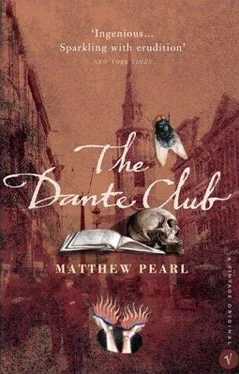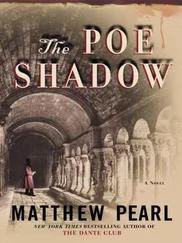“Fire, Mr. Longfellow,” Teal said. “You’ll fire now!” He put his hand on Longfellow’s and wrapped his fingers around the poet’s.
Swallowing hard, Holmes moved his musket away from Teal and pointed it directly at Longfellow.
Longfellow shook his head. Teal took a confused backward step, pulling his captive with him.
Holmes nodded firmly. “I’ll shoot him down, Teal,” he said.
“No.” Teal moved his head in rapid motions.
“Yes I will, Teal! Then he’ll not have had his punishment! He’ll be dead—he’ll be ashes!” Holmes yelled, aiming the musket higher, at Longfellow’s head.
“No, you can’t! He must take the others with him! This is not done!”
Holmes steadied the gun at Longfellow, whose eyes were tightly shut in horror. Teal shook his head rapidly and for a moment seemed about to scream. Then he turned as though someone were waiting behind him and then turned to his left and then his right, and finally ran, ran with fury away from the scene. Before he was too far down the street, a shot rang out, and then another ringing burst hung in the air, mixed with a dying cry.
Longfellow and Holmes could not help looking at the guns in their own hands. They followed the last sound. There on a bed of snow was Teal. Hot blood, cutting a rivulet through untouched white and unwilling snow, floated down from him. Two red spots gurgled in the man’s army blouse. Holmes knelt down and his brilliant hands went to work, feeling for life.
Longfellow inched closer. “Holmes?”
Holmes’s hands stopped.
Over Teal’s body stood a crazy-eyed Augustus Manning, his body trembling, his teeth chattering and fingers shaking. Manning dropped his rifle into the snow at his feet. He motioned with his stiff beard back at his house and pointed.
He tried to string his thoughts together. It was several minutes before anything coherent emerged. “The patrolman guarding my house left a few hours ago! Then just now I heard shouting and saw him through my window,” he said. “I saw him , his uniform… it all came to me, everything. He stripped my clothes, Mr. Longfellow, and, and… he tied me… took me without clothes…”
Longfellow offered a consoling hand, and Manning sobbed into the poet’s shoulder as his wife came running outside.
A police carriage halted behind the small circle they formed around the body. Nicholas Rey had his revolver out as he rushed over. Another carriage followed, carrying Sergeant Stoneweather and two more policemen.
Longfellow took Rey’s arm, his eyes bright and questioning.
“She’s fine,” Rey said before the poet could ask. “I have a patrolman watching her and her governess.”
Longfellow nodded his gratitude. Holmes had grabbed a fence railing in front of Manning’s house to catch his breath.
“Holmes, how wondrous! Perhaps you need to lie down inside,” Longfellow said with giddiness and fear. “Why, you’ve done it! But how…”
“My dear Longfellow, I believe daylight will clear up all that lamplight has left doubtful,” Holmes said. He led the policemen through town to the church and the underground tunnels to rescue Lowell and Fields.
“Hold, hold, wait a minute,” spat out the Spanish Jew to his crafty mentor. “Then ain’t that mean, Langdon, that you’ll be the very last of the Boston Five?”
“Burndy wasn’t one of the original five, my fair sheeny,” answered Langdon Peaslee omnisciently. “The Five were, bless each one of their souls as they drop into Hell below—and mine own, too, when I join them—Randall, who’s serving half-a-stretch in the Tombs; Dodge, who suffered from a nervous collapse and has retired out West; Turner, who was jammed by his ladybird of two and a quarter years—if that ain’t a lesson to not hitch yourself I haven’t heard one; and dear Simonds, holed up on the wharf side, too cup-shot to crack open a child’s jug.”
“Oh it’s a shame. A shame,” moaned one of the men in Peaslee’s audience of four.
“Say again?” Peaslee raised a limber eyebrow in reproach.
“A shame to see him about to walk the ladder!” the cross-eyed thief continued. “Never met the man, no. But I’ve heard it said he was just about the best safecracker Boston’s ever had! He could knock over a safe with a feather, says they!”
The other three listeners turned silent and, had they been standing rather than sitting at a table, might have shuffled their boots nervously on the rough shells littering the bar floor or wandered away at such a comment made to Langdon W. Peaslee. Under the circumstances, they took quiet swills of their drinks or absent drags on the unwrapped cigars that had been passed out by Peaslee.
The door to the tavern swung open and a fly propelled itself into the smoky black compartments that divided the barroom and buzzed around Peaslee’s table. A small number of the fly’s brothers and sisters had survived the winter and a smaller number still had thrived in certain sections of the woods and forests of Massachusetts and would continue to do so, though Professor Louis Agassiz of Harvard, had he known, would have declared it preposterous. With a darting glance, Peaslee noticed the strange flaming red eyes and large bluish body. He swatted it away, and at the other end of the bar, some men made sport of chasing it.
Langdon Peaslee reached for his strong punch, the special drink of the house at the Stackpole Tavern. Peaslee did not have to adjust his position in his hardwood chair to reach the drink with his left hand, even though the chair was pushed out a fair distance from the table so that he could adequately address his crooked semicircle of apostles. Peaslee’s arachnid arms allowed him to reach many things in life without the need to budge.
“Take my word for it, my good fellas, that our Mr. Burndy”—Peaslee hissed the name through the large gaps in his large teeth—”was merely the loudest safecracker the bean city’s ever seen.”
The audience accepted the defusing jest with a raising of their glasses and a peal of exaggerated laughter, fertilizing Peaslee’s already excessive grin. The laughing Jew stopped cold with a strained glance over the rim of his glass.
“What is it, Yiddisher?” Peaslee twisted his neck to see a man standing over him. Without a word, the minor thieves and pickpockets around Peaslee rose and veered off to separate corners of the bar, leaving behind aimless clouds of stale smoke to add to the windowless bar’s boiling atmosphere. Only the cross-eyed crook remained.
“Hike!” Peaslee hissed. The remaining cohort disappeared into the rest of the crowd.
“Now, now,” Peaslee said, looking his visitor up and down. He snapped for the barmaid, barely garbed in a low-necked dress. “Hob or nob?” the safecracker asked with a shining grin.
Nicholas Rey dismissed the server pleasantly with a motion of his hand as he took a seat across from Peaslee.
“Oh come now, Patrolman. Blow a cloud then.”
Rey refused the extended long-leaf cigar.
“What’s with the Friday face? These are bully times!” Peaslee refreshed his grin. “See here, the fellas were about to adjourn to the back to buck the tiger. We have it every other night, you see. I’m sure they wouldn’t mind you joining us. That is, unless you don’t have enough beans for an ante.”
“I thank you, Mr. Peaslee, but no,” Rey said.
“Well.” Peaslee put a finger to his lips, then leaned forward, as if to exchange a confidence. “Don’t think, Patrolman,” he began, “you haven’t been shadowed. We know you were after some goose who tried to kill that Harvard mooseface Manning, someone you seem to believe had something to do with the other Burndy murders.”
Читать дальше












